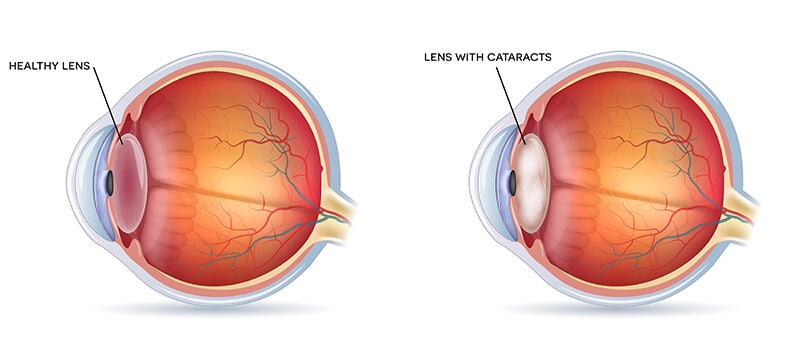Cataract

Cataracts, a common eye condition that often results from age, can cause blurred vision and decreased visual clarity, among many other symptoms. At Newton Wellesley Eye Associates, we specialize in providing comprehensive care for individuals with cataracts, offering advanced diagnostic tools and personalized treatment options to restore and improve vision.
What Are Cataracts?

Cataracts are a common eye condition where the natural lens inside your eye becomes cloudy. The lens helps you see clearly by focusing light onto the retina.
As you get older or due to other reasons, the proteins in the lens can clump together and form a cataract. Cataracts typically develop slowly, and some signs include blurry vision, sensitivity to light, trouble seeing at night, and colors appearing dull.
Aging is the leading cause of cataracts, but factors like genetics, certain medical conditions, eye injuries, and too much exposure to sunlight can also contribute to their formation. To treat cataracts, a surgical procedure is done to remove the cloudy lens and replace it with an artificial lens.
Cataract surgery is safe and commonly performed to improve vision and quality of life for people with cataracts.
Cataract Symptoms Checker






What Happens During Cataract Surgery?
During cataract surgery, the cloudy lens in the eye is removed and replaced with an artificial lens called an intraocular lens, also known as an IOL. The process begins with the administration of local anesthesia to ensure your comfort.
A small incision is then made in the eye, providing access to the cloudy lens. Your cataract surgeon skillfully breaks up the cataract into smaller pieces, which are then gently removed from the eye.

Afterward, the IOL is carefully implanted in place of the natural lens, restoring clear vision. The incision made during cataract surgery is designed to be self-sealing and typically does not require sutures.
Following the procedure, you will receive instructions on how to care for your eye during the healing process. It’s important to follow these guidelines to promote proper recovery and protect your vision.
While cataract surgery is generally successful, it does carry some risks, like any surgical procedure. Your cataract surgeon will discuss these potential risks with you and address any concerns you may have.
Cataract surgery is typically performed on an outpatient basis, meaning you can return home on the same day. With proper post-operative care, you can expect improved vision and an enhanced quality of life after the surgery.
Which IOL is Right for Me?
Selecting the right intraocular lens depends on your visual needs and lifestyle. Four main types of IOLs are commonly used:
Monofocal IOL
Offers clear vision at a single focal point, typically for distance. You may still need glasses for near or intermediate vision tasks.
Toric IOL
Corrects astigmatism by addressing irregular corneal shape, improving both distance and near vision. Reduces the need for astigmatism-correcting glasses.
Multifocal IOL
Provides clear vision at multiple distances, reducing dependence on glasses. However, it may cause halos, glare, or reduced contrast sensitivity.
Extended Depth of Focus (EDOF) IOL
This lens enhances intermediate vision, useful for computer work or reading. Balances near and distance vision, reducing the need for glasses.
Your eye doctor at Newton Wellesley Eye Associates will help you determine the most suitable IOL for you, considering factors like eye health and specific needs. Understanding the benefits and limitations of each type will help you make an informed decision.
What is Monovision?
Monovision is a vision correction technique commonly used in cataract surgery. It involves implanting different intraocular lenses in each eye to correct near and distance vision.
One eye receives an IOL optimized for distance vision, while the other eye receives an IOL optimized for near vision. The brain adapts by favoring one eye for distance and the other for near tasks.
Monovision can reduce the need for glasses, allowing individuals to see both far and near objects. However, it may slightly compromise depth perception and visual clarity compared to fully corrected vision in both eyes.
Do you think you may be experiencing cataract symptoms?
Schedule a cataract evaluation at Newton Wellesley Eye Associates in Newton, MA, today!






